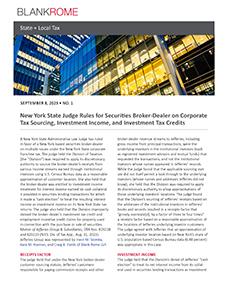New York State Judge Rules for Securities Broker-Dealer on Corporate Tax Sourcing, Investment Income, and Investment Tax Credits
A New York State Administrative Law Judge has ruled in favor of a New York-based securities broker-dealer on multiple issues under the New York State corporate franchise tax. The judge held the Division of Taxation (the “Division”) was required to apply its discretionary authority to source the broker-dealer’s receipts from various income streams earned through institutional investors using U.S. Census Bureau data as a reasonable approximation of customer location. She also held that the broker-dealer was entitled to investment income treatment for interest income earned on cash collateral it provided in securities lending transactions for which it made a “cash election” to treat the resulting interest income as investment income on its New York State tax returns. The judge also held that the Division improperly denied the broker-dealer’s investment tax credit and employment incentive credit claims for property used in connection with the purchase or sale of securities. Matter of Jefferies Group & Subsidiaries, DTA Nos. 829218 and 829219 (N.Y.S. Div. of Tax App., Aug. 31, 2023). Jefferies Group was represented by Irwin M. Slomka, Kara M. Kraman, and Craig B. Fields of Blank Rome LLP.
Receipts Factor
The judge held that under the New York broker-dealer customer sourcing statute, Jefferies’ customers responsible for paying commission receipts and other broker-dealer revenue streams to Jefferies, including gross income from principal transactions, were the underlying investors in the institutional investors (such as registered investment advisors and mutual funds) that requested the transactions, and not the institutional investors whose names appeared in Jefferies’ records. While the judge found that the applicable sourcing statute did not itself permit a look‑through to the underlying investors (whose names and addresses Jefferies did not know), she held that the Division was required to apply its discretionary authority to allow approximations of those underlying investors’ locations. The judge found that the Division’s sourcing of Jefferies’ receipts based on the addresses of the institutional investors in Jefferies’ books and records resulted in a receipts factor that “grossly overstate[d], by a factor of three to four times” a receipts factor based on a reasonable approximation of the locations of Jefferies underlying investor customers. The judge agreed with Jefferies that an approximation of underlying investor location based on New York’s share of U.S. population-based Census Bureau data (6.48 percent) was appropriate in this case.
Investment Income
The judge held that the Division’s denial of Jefferies’ “cash election” to treat its net interest income from its collateral used in securities lending transactions as investment income was “contrary to the statute’s plain language.” The judge concluded that the statute did not limit a taxpayer’s right to make a cash election to treat actual cash on deposit as investment capital only to instances where the cash was used for investment purposes. The judge further concluded that 2007 amendments to the regulations limiting the availability of the cash election for “securities lending agreements” did not pertain to the actual cash collateral, and therefore had no bearing on the case.
Investment Tax Credit (“ITC”)/Employment Incentive Credit (“EIC”)
The judge also held that the Division improperly disallowed certain ITC and EIC claimed by Jefferies. Among other things, the judge found that the Division’s disallowance of the ITC and EIC for property placed in service by Jefferies for its investment banking, prime brokerage, and research departments, which disallowance was based on the Division’s questionable published guidance, was unsupportable under the statutory language.
For additional information about this ruling, contact Irwin M. Slomka, Kara M. Kraman, Craig B. Fields, or another member of Blank Rome’s State + Local Tax group.


